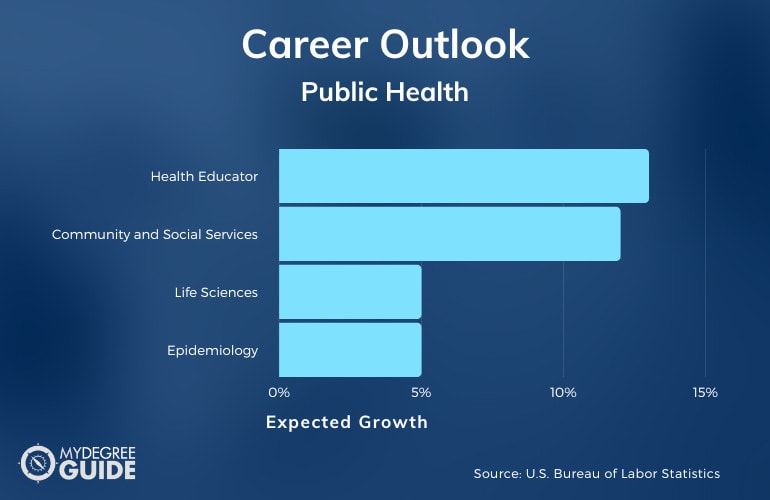If you want to be an influential person whose work benefits others, you may want to check out a few online MPH no GRE programs.

The sooner that you can get started on your master’s in public health degree online, the sooner you can start working to improve the health and well-being of entire communities, whether locally or globally.
Editorial Listing ShortCode:
List of 50 Universities Offering Online MPH Programs No GRE Required
If you want to earn an MPH online, and don’t want to worry about submitting a GRE score, start narrowing your options with these schools.
Methodology: To be included in this list, we reviewed each university’s accreditation, admission requirements, and breadth of online program offerings. The following universities offer accredited online MPH degrees without a GRE or they offer GRE waivers for qualified students.
1. A.T. Still University
As a student in the Masters of Public Health program at A.T. Still University, you can follow a CEPH-accredited course of study that aligns with approved public health standards. All professors in this program have received doctorates, and they’ve worked in a variety of backgrounds, so you should receive a thorough, well-rounded education.
Classes are limited in size, which can give you the opportunity to really interact with your professors.
This school has campuses in both Missouri and Arizona, and the program has received HLC accreditation. In addition to taking classes in subjects like epidemiology, biostatistics, health policy and informatics, you’ll also be expected to complete a practicum in the public health field.
During your coursework, the school will provide access to tutoring, career counseling and other student services.
- MPH – Dental Public Health
- MPH – Generalist
- MPH-DMD Joint Degree
- MPH-DO Joint Degree
ATSU is accredited by the Higher Learning Commission of the North Central Association of Colleges and Schools.
2. American Public University
At American Public University in West Virginia, you can earn a generalist master’s degree in public health. Therefore, getting your master’s degree from APU can help prepare you for a career in a wide variety of related fields.
Classes at APU cover topics like healthcare ethics, the environment, epidemiology, and health research. They are designed to help students learn to consider the motives that factor into people’s health decisions. To finish your studies, you’ll be expected to complete a practicum. Both accelerated and standard-length classes are available, so you can choose the format that best suits your schedule.
The course of study has received certification from CEPH and HLC.
APUS is regionally accredited by the Higher Learning Commission.
3. Azusa Pacific University
If you have a particular career goal in mind, then consider the master’s from Azusa Pacific University, where you can select one of seven different specialties.
These include Disaster Health and Emergency Preparedness, Environmental Health, and Social and Behavioral Science. Key areas of focus for these programs include ethics, diversity, communication and strategic planning.
Accelerated courses are available for those who wish to finish school at a quick pace, or you can select the option to enroll in school part-time. At the end of your classes, you’ll be expected to complete a hands-on practicum related to your chosen specialty, and you’ll need to submit a capstone project.
- MPH – Biostatistics and Epidemiology
- MPH – Disaster Health and Emergency Preparedness
- MPH – Environmental Health
- MPH – Health Policy and Administration
- MPH – Health Promotion and Education
- MPH – International Health
- MPH – Social and Behavioral Science
APU is accredited by the WASC Senior College and University Commission.
4. Baylor University
Improving the health of whole groups of people can begin with getting your master’s degree from Baylor University, where the focus of the program is on Community Health. You’ll have to begin your coursework by visiting Baylor’s campus in Texas, and then you can start online studies.
Baylor’s online program uses a platform for live interaction between students and professors, and it grants you the option to study at local WeWork office spaces. You can choose to enroll in Baylor’s program for part-time or full-time studies. Classes in this program cover topics such as statistical analysis, environmental health, epidemiology, leadership and health behavior.
Completing a practicum is optional, but all students must serve in an internship as part of the required graduate project.
- MPH – General Public Health
Baylor‘s accreditation is through SACSCOC.
5. Benedictine University
At Benedictine University, earning an MPH can help prepare you to take on a leadership position in an institution dedicated to health and wellbeing. From this school, you can opt to earn a graduate certificate in your specialty of choice: Health Management and Policy, Epidemiology, or Health Education and Promotion.
Alternatively, you can opt for a more general degree by rounding out your course of study with electives instead. All students must complete an internship, and if you choose to earn a certificate, you’ll be expected to complete a capstone project as well. Students have access to services like career counseling and library resources.
- MPH – General Public Health
- MPH-MBA Joint Degree
- MPH-MIS Joint Degree
- MPH-MNW Joint Degree
- MPH-MSMOB Joint Degree
Benedictine University has accreditation from HLC.
6. California State University – Northridge
If your goal is to help people learn more about their health or to study the spread of infectious diseases, consider getting your master’s degree online from California State University – Northridge. Two specialties are available from CSUN: Applied Epidemiology and Community Health Education.
Classes in the master’s program from this California school cover topics like biostatistics, occupational health, environmental health, leadership, research, health behavior and epidemiology. In addition to the required courses, you’ll have the option to select from a variety of electives related to your chosen specialty.
At the end of your program, you’ll be expected to complete either a thesis or a graduate project.
- MPH – Community Health Education
CSU Northridge is accredited by the WASC Senior College and University Commission.
7. Capella University
Online education doesn’t stop the opportunity for hands-on learning when you sign up for the MPH at Capella University. With the school’s innovative Vila Health program, you’ll receive opportunities to solve problems and apply your knowledge in a simulated healthcare environment. Plus, all students participate in a practicum before graduation.
Before beginning your practicum, you’ll be expected to take classes covering epidemiology, leadership, biostatistics, economics, psychology and other relevant topics. For those who don’t feel confident about their ability to stay organized while receiving an online education, Capella offers the optional GuidedPath format, in which you can receive extra structure and guidance.
In addition, all students have access to advisors and counselors throughout the schooling process.
- MPH – General Public Health
Capella University is accredited by the Higher Learning Commission.
8. Chicago School of Professional Psychology
When you enroll in the online master’s program from The Chicago School, you can select a concentration in Mental Health and Behavioral Aspects of Public Health or a concentration in Public Policy Development and Advocacy.
Students in this program can take core classes about healthcare in the United States and around the world, learn to design and implement programs, and acquire scientific skills that can help in the public health field. Students are also expected to complete a fieldwork seminar and submit a capstone research paper.
- MPH – General Public Health
The Chicago School of Professional Psychology has been accredited by the Western Association of Schools and Colleges.
9. Colorado School of Public Health
The 42-credit-hour course of study at the Colorado School of Public Health is designed to be completed in two years. You can take all of your classes online, but you can only complete one degree concentration via distance learning.
- MPH – Leadership in Public Health Practice
The Colorado School of Public Health is accredited by the Council on Education for Public Health.
10. Concordia University
From Concordia University in Nebraska, you can earn a master’s with a focus on Community Health Education or Health Policy and Administration. These programs are designed to help you serve in leadership capacities with the goal of making a difference in the health status of poor or vulnerable communities.
The core classes cover topics like biostatistics, environmental health, leadership, research and epidemiology.
All students must complete a practicum. If you choose to take the Global Health course as part of the Community Health Education concentration, you can participate in a mission trip to a foreign country. This school uses an accelerated schedule for online learning, so each course is eight weeks long.
- MPH – Community Health Education
- MPH – Health Policy and Administration
Concordia University is accredited by the Northwest Commission on Colleges and Universities at the undergraduate and graduate levels.
11. Creighton University
At Creighton University, you can focus on Healthcare Management or Health Policy and Ethics as you pursue your master’s in public health. In fact, you’ll have the opportunity to earn a graduate certificate in whichever concentration you choose.
As you take classes with this Nebraska-based university, your training can help equip you to use your new knowledge in service to others.
Creighton’s program is part of its Department of Interdisciplinary Studies, so you’ll have opportunities to learn from professors with a variety of backgrounds. In fact, this HLC-accredited school has all students take a writing class in addition to courses in biostatistics, health ethics, research, management and more.
You’ll be expected to complete the required practicum in three stages: a pre-practicum class, the experience itself and a capstone project.
- MPH – Healthcare Management
- MPH – Health Policy and Ethics
Creighton is accredited by the Higher Learning Commission.
12. Des Moines University
You can earn a CEPH-accredited master’s in public health from the online program at Des Moines University. The school offers three different concentrations: Public Health Practice, Health Education and Promotion, or Public Health Administration and Policy.
The school’s goal is to produce students who lead well, communicate clearly, put data to good use and direct policies that benefit others. Therefore, courses cover topics like health law, grant writing, biology, social sciences, statistics and occupational health.
With any of the concentrations, you have the option to select a few electives in addition to your core classes. Near the end of your studies, you’ll be expected to participate in a practicum and assemble a portfolio.
- MPH – Generalist
- MPH – Community Health
- MPH – Epidemiology
DMU is accredited by Higher Learning Commission (HLC).
13. Eastern Virginia Medical School
Notably, this is the very first American institution to produce a viable fetus via the process of in vitro fertilization.
At the Eastern Virginia Medical School, you can complete your MPH in five semesters. You could also complete an MPH/MD dual degree in five years.
- MPH – Epidemiology
- MPH – Health Management and Policy
EVMS is accredited by the Southern Association of Colleges and Schools.
14. Emory University
If you’ve been working in the public health field for at least three years, you may qualify to enroll in the master’s degree program at Emory University. At this school, you can select a concentration in Applied Epidemiology, Prevention Science or Applied Public Health Informatics.
The core classes address topics like social behavior, environmental health, population growth, and the structure of the United States healthcare system.
Emory University’s online program follows a standard university calendar, and new students always begin their courses in the fall. Although you can complete most of your Emory University coursework online, you will need to report to the Georgia campus two times each semester.
- MPH – Applied Epidemiology
- MPH – Applied Public Health Informatics
- MPH – Health Care Outcomes
- MPH – Prevention Science
Emory University is accredited by the Southern Association of Colleges and Schools Commission on Colleges.
15. Florida International University
For a generalist master’s in public health, enroll in Florida International University’s online program. The broad focus of this degree can help you pursue work in a number of different public health settings.
You can choose to enroll in this CEPH-accredited program on a full-time or part-time basis. The core classes include studies in health policy, statistics, environmental health, data analysis and risk assessment.
You’ll also get to choose several elective classes, such as Environmental Disaster and Human Health, Health Promotion in Culturally Diverse Communities, and AIDS Epidemiology. Your studies will culminate in a practicum unless you qualify for a waiver based on your professional experience.
- MPH – General Public Health
Florida International University is accredited by the Southern Association of Colleges and Schools Commission on Colleges.
16. George Washington University
As a student at George Washington University, you can choose to focus your master’s studies on one particular area of public health or to receive a broad overview of the field. Your chosen path might mean that you take elective classes like Global Health Frameworks, Community Engagement and Advocacy, or Global Child Health.
Four enrollment sessions begin each year, so you won’t have to wait until the fall semester to begin your schooling. When enrolled at GWU, you can choose to complete your studies in a full-time accelerated, full-time non-accelerated or part-time non-accelerated format. GWU staff are available to provide academic guidance and career counseling to students throughout their studies.
- MPH – General Public Health
GW is regionally accredited by the Middle States Commission on Higher Education.
17. Johns Hopkins University
When Johns Hopkins gave the university hospital $7 million in 1876, that was the largest donation in American history.
Today, the school enrolls more than 20,000 graduate students and has campuses in Washington, D.C. as well as China and Italy.
Online MPH students can start in January or June.
- MPH – Child and Adolescent Health
- MPH – Epidemiology & Biostatistical Methods
- MPH – Food, Nutrition and Health
- MPH – Global Environmental Sustainability & Health
- MPH – Health in Crisis and Humanitarian Assistance
- MPH – Health Leadership & Management
- MPH – Health Systems and Policy
- MPH – Individualized Plan
- MPH – Infectious Diseases
- MPH – Social & Behavioral Sciences in Public Health
- MPH – Women
Johns Hopkins is accredited by the Middle States Commission on Higher Education.
18. Kent State University
Are you interested in studying Health Policy and Management or Social and Behavioral Sciences? With Kent State University’s online MPH program, you have the option of choosing either of these concentrations. You’ll be expected to take an assortment of core classes, concentration-specific classes and electives. Each class lasts seven weeks and are typically taken one at a time.
Throughout your course of study, you will be expected to learn about health legislation, practice oral and written communication, gain experience in gathering and analyzing data, and investigate the structure of the American healthcare system. You will also need to complete a practicum in which you can start putting your education into practice.
- MPH – Health Policy and Management
Kent State University is accredited by the Higher Learning Commission.
19. Liberty University
For an entirely online master’s in public health program, look to Liberty University. This program is suitable for those who are new to the field and those with professional experience.
You can choose from Global Health, Nutrition or Health Promotion for your concentration. Depending on which path you select, you may take classes related to food safety, sanitation, obesity, infectious diseases or advocacy.
After taking your required classes and passing a competency exam, you will be expected to complete a practicum.
This university offers an accelerated schedule that features eight-week online classes. Depending on your previous studies, you may be able transfer in up to 50% of the required credits.
- MPH – Global Health
- MPH – Health Promotion
- MPH – Nutrition
Liberty University is accredited by the Southern Association of Colleges and Schools Commission on Colleges.
20. Loma Linda University
Two of Loma Linda’s MPH concentrations are available for fully online participation. You can choose from Health Education and Wellness Coaching or Population Medicine. No matter which concentration you choose, you’ll studies will likely begin with core classes in community health, healthy lifestyles and healthcare systems.
After that, you should be able to participate in classes specific to your area of focus; these may cover topics like anatomy, pharmacology, health systems and leadership. In addition, you may sign up for a cognate of electives that focus around a specific area of interest, or you may choose individual electives instead. At the end of your studies, you’ll be expected to complete a practicum.
- MPH – Lifestyle Management
- MPH – Population Health
- Online DrPH – Health Education
Loma Linda is accredited by the Western Association of Schools and Colleges (WASC).
21. Loyola University Chicago
With Loyola University, you can earn your degree fully online if you choose a concentration in Public Health Policy and Management. If you’d prefer to focus on Epidemiology or Global Health Equity, you can take some online classes but will also need to report to campus throughout the program. Social justice is a key focus of all Loyola degree concentrations.
For the university’s fully online program, some of the topics you’ll likely study include biostatistics, epidemiology, community preparedness, health marketing and research. In addition to those core classes, you can select electives that can help you learn more about health policies or health management. You’ll also be expected to complete a practicum and a capstone project.
- MPH – Public Health Policy & Management
LUC is accredited by the Higher Learning Commission.
22. Massachusetts College of Pharmacy and Health Sciences
You can enroll in school part-time or full-time to earn the master’s in public health from MCPHS University. Required classes cover topics like research, epidemiology and environmental health. Plus, you’ll get to choose some elective courses, such as Maternal and Child Health or Public Health Genetics.
After going through your coursework, you’ll end your studies with a culminating experience. Three start dates throughout the year provide flexible scheduling options. Although the classes are conducted fully online, you will be required to visit Boston at the beginning of your studies.
- MPH – General Public Health
MCPHS University is accredited by the New England Commission of Higher Education.
23. Medical College of Wisconsin
The online master’s in public health program from Medical College of Wisconsin provides a graduate-level education with a focus on Public Health Practice. The goal of the program is to train students to assess community health, formulate problem-solving strategies, and evaluate the results of their initiatives.
At this Wisconsin school, core classes include studies in administration, biostatistics, ethics, and community health, and you can choose some electives also. You’ll be expected to participate in a field experience and complete a capstone project before graduation. Depending on your previous studies, you may be able to transfer up to 14 credits from another school.
- MPH – General Public Health
- Online BS-MPH Joint Degree
The Medical College of Wisconsin is accredited by the Higher Learning Commission.
24. National University
California-based National University offers three specializations for its master’s in public health degree: Health Promotion, Healthcare Administration and Mental Health. Students participate in core classes that cover topics like healthcare in the United States, health behavior and research methods and then take classes related to their chosen specialty.
To complete your degree, you can choose whether to participate in a global health experience or to do an internship with a capstone project. At this school, you take one class at a time, and each one is just four weeks long. Enrollment is available throughout the year.
- MPH – General Public Health
National University has been accredited by the WASC Senior College and University Commission (WSCUC).
25. New York Medical College
At New York Medical College, you can earn your master’s degree entirely online, or you can take a mix of online and on-campus classes. There are three concentrations available: Behavioral Science and Health Promotion, Environmental Health Science, and Health Policy and Management.
You can complete any of the programs at a traditional pace, or you can opt for an accelerated pace if you choose the Health Policy and Management Concentration.
Fall and spring start dates are available. In conjunction with your master’s program, you can opt to earn a graduate certificate as well.
- MPH – Behavioral Sciences & Health Promotion
- MPH – Environmental Health Science
- MPH – Health Policy & Management
NYMC is accredited by the Middle States Commission on Higher Education (MSCHE).
26. Northern Illinois University
The master’s program at Northern Illinois University allows you to focus on Health Promotion or Health Services Management. After graduation with a Health Promotion concentration, you can take the test to become a Certified Health Education Specialist.
Enrolling in certain Health Services Management classes can help prepare you for taking the Illinois Nursing Home Administrators Licensing Examination.
Core classes cover topics like health law, biostatistics and environmental health. With this Illinois-based school, you’ll be expected to serve an internship and submit a written project. Thesis and non-thesis options are available for either concentration.
- MPH – Health Promotion
- MPH – Health Services Management
Northern Illinois University is accredited by the Higher Learning Commission.
27. Nova Southeastern University
You can earn a generalist master’s in public health degree from Nova Southeastern University in Florida.
In addition to taking core classes, you can select from a wide variety of electives, such as Tropical Diseases, Vaccines and Vaccine-preventable Diseases, School Health, and Public Health Genomics. You’ll be expected to participate in an integrative learning experience and a field experience.
The school’s online classes rely on some synchronous sessions, in which you’ll meet with professors and fellow students at set times. You’ll also need to visit the campus once at the beginning and once at the end of your studies.
- MPH – Generalist
- MPH – Generalist (Spanish language option)
NSU is accredited by the Southern Association of Colleges and Schools Commission on Colleges.
28. Regis College
When you attend Regis College, you can get a master’s in public health with a concentration in Health Policy and Management or a concentration in Epidemiology. You’ll be expected to take core classes in environmental health, behavioral science and other foundational topics.
Health Policy and Management students study topics like policies, programs and ethics. Epidemiology students take classes in chronic and infectious diseases, data analysis and study designs.
With either concentration, you’ll be expected to complete your coursework with a field practicum and a capstone project. New students can begin classes in the spring, summer or fall.
- MPH – Epidemiology
- MPH – Health Policy and Management
Regis College is accredited by the New England Commission of Higher Education.
29. Salus University
The master’s in public health program from Salus University is committed to the 2009 Istanbul Declaration’s call to pursue the health of populations around the globe. When you study with this Pennsylvania school, you’ll be expected to take classes in epidemiology, behavioral health, bioterrorism and bioethics.
You’ll also be able to choose from a variety of electives on topics like grant writing, aging populations and human rights. Included with your studies, you’ll be expected to engage in practice experiences and finish with an integrated learning experience. This may involve an exam, a seminar or a project.
- MPH – General Public Health
Salus University is accredited by the Middle States Commission on Higher Education.
30. Simmons University
If social justice is important to you, then consider obtaining your master’s in public health from Simmons College, where the concepts of justice and health go hand in hand. This Massachusetts school relies on a hybrid approach to online education. In addition to independent modules that you can complete at your own pace, there are live online classes that you must attend.
Additionally, you’ll be expected to meet with students and professors twice during your program for an in-person immersion session. You’ll need to go to Boston for one of them and travel off-site for the other. Because the ratio of students to faculty is about 15 to 1, you can count on personalized attention during your time at Simmons.
- MPH – General Public Health
Simmons University is accredited by the New England Commission of Higher Education.
31. Southern New Hampshire University
You can earn a generalist master’s of public health from Southern New Hampshire University, or you can opt for a concentration in Global Health. The core classes for all students cover topics like behavioral science, program implementation, environmental science and biostatistics.
During your time in the program, you’ll be expected to engage in a practical experience and complete a capstone project. You’ll have access to your coursework around the clock, so you can study when it’s convenient for you. If you’re eager to get started on your graduate program, you may appreciate that this New Hampshire university has new sessions that start throughout the year.
- MPH – Global Health
Southern New Hampshire University is accredited by the New England Commission of Higher Education.
32. Texas A&M University
At the Texas A&M Health Science Center, you can take classes online or in person and choose from six different concentrations.
Part of the Texas A&M University since 2013, students of the Health Science Center can enjoy all of the support that comes from enrolling in a large, prestigious institution.
- MPH – Biostatistics
- MPH – Epidemiology
- MPH – Environmental Health
- MPH – Health Policy and Management
- MPH – Health Promotion and Community Health Sciences
- MPH – Occupational Safety and Health
Texas A&M is accredited by the Southern Association of Colleges and Schools Commission on Colleges.
33. Tulane University
If you’re a professional who is looking to further your public health knowledge, consider Tulane’s online master’s program. This course of study will require you to check in at set times for live online classes. You’ll have to travel twice — once to New Orleans and once elsewhere — for immersions that will last a few days each.
At the end of the program, you’ll be expected to complete an integrated learning experience to demonstrate your competency and knowledge acquisition. You must have professional experience in this field before you can enroll in the master’s program.
- MPH – Disaster Management
- MPH – Occupational & Environmental Health
- MPH – Occupational Health & Safety Management
- Online MSPH – Industrial Hygiene
Tulane University is accredited by the Southern Association of Colleges and Schools Commission on Colleges.
34. University of Alabama – Birmingham
UAB was an extension of the University of Alabama, founded in 1936 but has been an independent institution since 1969. At this university, you can take 140 different programs. It enrolls 20-25,000 students per year and runs its own Health System. UAB Hospital has the distinction of being the only Level 1 trauma center in the state.
UAB is also the #1 largest employer in Alabama.
- MPH – Environmental Health & Toxicology
- MPH – Epidemiology
- MPH – Health Behavior
- MPH – Health Care Organization
- MPH – Industrial Health
- MPH – Industrial Hygiene (Accelerated)
- MPH – Maternal & Child Health Policy and Leadership
- MPH – Occupational Health & Safety
- MPH-MSW Joint Degree
- Online MSPH – Outcomes Research
The University of Alabama at Birmingham is accredited by the Southern Association of Colleges and Schools Commission.
35. University of Alaska – Anchorage
If you plan to work in Alaska or other far-north areas, you may want to earn your master’s from the University of Alaska Anchorage. Although all students can benefit from this program, the university focuses its coursework on needs that are specific to this region of the world. Core courses also address topics like occupational health, disaster management and administration.
At this school, you’ll need to complete a practicum, and you’ll be expected to craft a thesis or a project based on this experience. You can complete your master’s entirely online, but you will have to visit the Alaska campus to present your final project before graduation.
- MPH – Public Health Practice
- MPH-MSW Joint Degree
The University of Alaska Anchorage is accredited by the Northwest Commission on Colleges and Universities.
36. University of Albany – SUNY
If you want to learn how to take theoretical health concepts and put them into practice, look into the master’s in public health online program from the University of Albany – SUNY. All students in this program graduate with a concentration in Public Health Practice. Courses include coverage of topics like leadership, biostatistics and program development.
You’ll have to wrap up your studies with an internship experience and a capstone project. The online program offers asynchronous studies so you can log in on your schedule. Most of your classes will likely have no more than 25 students.
- MPH – Public Health Practice
- MPH-MD Joint Degree
University of Albany – SUNY is accredited by Middle States Commission on Higher Education.
37. University of Arizona
At the University of Arizona, you can choose from one of three specialties for your master’s in public health: Health Promotion, Applied Epidemiology or Health Services Administration.
Half of your credits will likely come from core classes that cover fundamental topics like social, behavioral, environmental and occupational health. These classes are also designed to help you learn about healthcare policies, management and finances.
The other half of your credits should focus on topics related to your chosen specialty. To culminate your studies, you’ll be expected to complete an internship and a master’s report. Professional or volunteer experience in the field is required for admission to the Health Services Administration program.
- MPH – Epidemiology
- MPH – Health Behavioral & Health Promotion
- MPH – Health Services Administration
- Online Bachelor’s in Public Health
University of Arizona is accredited by the Higher Learning Commission.
38. University of Massachusetts – Amherst
Designed with current public health practitioners in mind, the master’s program at UMass Amherst has a Public Health Practice concentration. Students are expected to take core classes that cover topics like biostatistics and environmental health, but many credits come from elective classes.
This structure allows students to select the classes that best fit their particular area of practice. Options may include Emerging Infectious Diseases, Comparative Health Care Systems and Health Disparities. Students wrap up their studies with a practicum and a capstone project that synthesizes what they’ve learned along the way.
This Massachusetts-based program admits one batch of students each fall and another in the spring.
- MPH – Nutrition
- MPH – Public Health Practice
The University of Massachusetts Amherst is accredited by the New England Commission of Higher Education.
39. University of Minnesota
If you’re interested in improving health outcomes for women and children, then attending the University of Minnesota might be the right fit for you. The school offers an online public health degree with a concentration in Maternal and Child Health. You can take all your classes online, or you can opt for a hybrid approach by doing some classes at the school’s Minnesota campus and others online.
Those with professional experience or another advanced degree in this area can register for the advanced-standing track, which requires fewer credit hours than the standard track. Before graduation, you’ll be expected to complete an applied practice experience and an integrated learning experience.
- MPH – Maternal & Child Health
- Online MHA – Healthcare Administration
The University of Minnesota has HLC accreditation.
40. University of Montana
For those interested in serving rural populations, consider earning your master’s degree through the University of Montana. The school has a generalist master’s in public health available for online studies.
Several of the core classes address the specific healthcare needs of rural communities. During your time in the program, you’ll be expected to complete a practicum, submit a portfolio and present an oral defense.
As an alternative to the generalist degree, if you’re willing to do a hybrid program with some online classes and some classes on the campus of this Montana school, you can earn a degree with a concentration in Community Health and Prevention Sciences.
- MPH – General Public Health
- MPH – Community Health and Prevention Sciences.
The University of Montana-Missoula is accredited by the Northwest Commission on Colleges and Universities.
41. University of Nevada – Reno
For tools that you can put into practice on the job, consider a master’s degree from the University of Nevada – Reno. The school’s program includes a concentration in Public Health Practice.
Therefore, in addition to core classes, you can take specialty courses to help you learn more about healthcare law, finance, programs and data collection. You’ll also need to complete a practicum and work on a capstone project.
This Nevada school offers several start dates throughout the year, so you can begin your degree program when it works for you.
- MPH – Public Health Practice
The University of Nevada – Reno is accredited by the Northwest Commission on Colleges and Universities.
42. University of New England
Students in the University of New England’s online program can earn a generalist master’s degree in public health. This program is conducted entirely online, and its asynchronous format means that you can log in at times that are convenient for you. Each class is eight weeks long, and classes are available during the spring, summer and fall.
In addition to taking core classes, completing a practicum and writing a capstone paper, you’ll have opportunities to take several electives. Your choices might include Public Health Financial Management, Infectious Disease Epidemiology, Health Economics and The Obesity Epidemic. You can transfer in up to nine credits from other CEPH-accredited schools.
- MPH – General Public Health
The University of New England is accredited by the New England Commission of Higher Education.
43. University of North Carolina
The online program from the University of North Carolina offers four different public health concentrations from which to choose. These include Nutrition, Health Policy, and Leadership and Practice. You can also choose the Master’s in Public Health/Registered Dietician path, which can help prepare you to become a certified RD.
During your time in the program, you’ll be expected to attend live online classes, watch video case studies and interact with fellow students. Your education should consist of core classes, classes specific to your specialty, electives, a practicum and a final paper. The faculty keep online office hours, so you’ll have opportunities to check in with them for one-on-one help.
- MPH – Health Policy
- MPH – Leadership in Practice
- MPH – Nutrition
- MPH/RD
UNC has SACSCOC accreditation.
44. University of North Dakota
To learn about serving the healthcare needs of indigenous people groups, consider studying with the University of North Dakota.
One of the school’s three online master’s concentrations is Indigenous Health. Another fully online concentration is Health Management and Policy. The third option is Population Health Research and Analytics, but it requires that you spend some time on the campus of this North Dakota university.
To participate in online classes from UND, you’ll need to log in at set times to watch live lectures and interact with your fellow classmates. You’ll be expected to put your education to work by participating in a practicum. At the end of the CEPH-accredited program, you can take the CPH exam.
- MPH – Health Management and Policy
- MPH – Population Health Analytics
UND is accredited by HLC.
45. University of North Texas Health Science Center
You have two options for taking an online MPH at the University of North Texas Health Science Center. The first is for students who have not worked in the field. It’s a slightly longer degree, with 48 credit hours.
The second option is for those with public health working experience and is a 42-credit-hour degree.
Both options are offered fully online and culminate in one concentration choice.
- MPH – Public Health Leadership
UNTHSC is regionally accredited by the Commission on Colleges of the Southern Association of Colleges and Schools.
46. University of San Francisco
You can earn a fully online master’s with a concentration in Community and Public Health Practice from the University of San Francisco. The goal of this program is to embody the core values of “Care, Learn, Act.”
You’ll be expected to participate in virtual classes to learn about topics like environmental health and behavioral science. At times, you may need to visit the California campus for meetings.
You’ll need to complete your studies with hands-on fieldwork and a capstone project that synthesizes your findings. You and a cohort of about 25 participants will move through this part-time program together.
- MPH – Behavioral Health
- MPH – Community and Health Practice
- MPH – Health Policy Leadership
The University of San Francisco is accredited by the Western Association of Schools and Colleges.
47. University of South Florida
To find a specialty that closely aligns with your personal career goals, consider enrolling in classes at the University of South Florida. This school offers seven different concentrations, including some unique offerings, such as the Global Disaster Management, Humanitarian Relief and Homeland Security specialty. Other options include Infection Control and Social Marketing.
Online classes from this university use a variety of multimedia approaches to help you learn the information; these include blogs, podcasts and online discussion groups. Before graduation, you’ll be asked to put your skills to work during a local or international practicum, and you’ll need to take a comprehensive exam.
- MPH – Epidemiology
- MPH – Global Disaster Management, Humanitarian Relief & Homeland Security
- MPH – Health, Safety & Environment
- MPH – Infection Control
- MPH – Nutrition and Dietetics
- MPH – Public Health Practice
- MPH – Social Marketing
USF is accredited by the Southern Association of Colleges and Schools’ Commission on Colleges.
48. University of Vermont
During the generalist master’s of public health program from the University of Vermont, you’ll be expected to begin with core classes then progress to advanced core classes. You may also select several electives that align with your career goals. You might choose Climate Change and Public Health, Controversies in Health Economics, or Investigating Disease Outbreaks.
You’ll be asked to do hands-on work during a short applied practice experience, and you’ll have to finish your studies with a capstone project. Whether you’ve been working in the public health arena for years or are new to this area of study, the UVM program might be a good fit for you.
- MPH – General Public Health
The University of Vermont is accredited by the New England Commission of Higher Education.
49. Walden University
Take your career to the next level and be a force for societal change with a master’s degree from Walden University in Minnesota. Your degree program can help enhance your leadership and communication skills, perform careful analyses of various health concerns, and create useful health programs.
Classes in this program cover topics like health politics, program evaluation and environmental health.
You’ll be expected to complete a hands-on practicum and submit a final project that involves writing a grant proposal or implementing a program plan. Depending on your previous studies, you may be able to transfer in up to 32 credits.
- MPH – General Public Health
Walden University is accredited by The Higher Learning Commission.
50. West Coast University
The accelerated schedule at West Coast University in California means that you can finish each class in just eight weeks. This is a generalist master’s, so it can help prepare you to work in a variety of career settings. Classes cover topics like diversity, behavioral science, epidemiology and infectious diseases.
You may have internship opportunities, and you’ll be expected to complete your studies with a capstone project. Student support services include weekly online office hours for faculty. Additionally, graduates receive ongoing career guidance after completing their degrees.
- MPH – General Public Health
West Coast University has accreditation from WSCUC.
What Types of Public Health Degrees are Offered?

If you are interested in public health, you can earn a degree at the undergraduate or graduate level.
Master’s in Public Health (MPH)
A master’s degree can help equip you with more advanced knowledge, so it may better prepare you for public health leadership positions.
Many students seek a master’s after already studying or working in public health, but you can also pursue a master’s degree in order to work in this field for the first time.
If you know you have a strong interest in public health, you may want to start with a bachelor’s degree in the field and work your way up.
Master of Public Health Specializations

Public Health is a broad field. Consider these specializations for a more exact career path.
- Behavior and Social Sciences: If you want to understand why people make the health choices that they do, then consider this concentration for your master’s degree. Not only can this concentration help you learn what influences people’s decision-making, but it can also help you gain tools that you can use to effectively encourage healthy choices.
- Biostatistics: Biostatisticians gather data about living things. Then, they analyze the data and use it to find solutions to pressing health concerns. Their studies might be related to diseases, life expectancy, or pharmaceutical effectiveness. If you are both math- and science-minded, biostatistics might be the right specialization for you.
- Disaster Management: Emergency situations and widespread disasters can affect the health of many people at once. With a specialization in disaster management, you can help communities prepare for or mitigate the effects of emergency situations, or you can help improve health outcomes once a disaster strikes.
- Environmental Health: If your environment is unhealthy, then your personal health is likely to suffer as well. Students of this discipline learn to improve people’s health by reducing their exposure to environmental hazards, such as pollution. They may use data analysis or policy implementation to drive change.
- Epidemiology: Epidemiologists study the spread, frequency, or causes of various health situations on a population-wide scale. The problems you study might relate to infectious diseases, pollution, accidents, or acts of violence. Your findings can help you propose solutions to the problems that affect people’s health.
- Global Public Health: If you have an interest in solving health problems in populations around the world, then you might be interested in studying global public health. This type of program often places a strong emphasis on health equality and social justice, and the focus may be on improving the health of under-served populations.
- Health Services Administration: If you’re interested in a leadership position in a healthcare organization, then you might want an administration focus for your master’s degree. Your studies might emphasize systems, laws, policies, and communication skills. You’ll probably learn how to design, implement, and evaluate programs.
- Public Health Education: If equipping others with the knowledge and skills to make healthy choices is important to you, then you may want to become a public health educator. You might teach people directly, or you might work behind the scenes to direct programs and policies that make a difference.
- Public Health Policy: Laws, rules, and guidelines related to health are known as health policies. These may be enacted at the local, state, federal, or international levels. Studying public health policy can help you become better equipped to evaluate, direct, implement, and enforce the rules and guidelines that affect the health of various populations.
Whichever specialization you choose to study, it can help open doors to a variety of jobs.
What Does a Public Health Worker Do?

As an expert in the field of public health, you could stay close to your local community or make a difference in a country on the other side of the world.
Wherever you choose to serve, you’ll have opportunities to invest your time and energy to improve the health of communities or populations. You may work behind the scenes to gather data or craft policies, or you may work directly with people or organizations to encourage healthy choices.
You could:
- Develop methods for keeping communities clean and sanitary.
- Reduce the spread of sexually transmitted infections.
- Promote healthy environmental policies and practices.
- Maintain databases with health-related statistics.
- Supervise workplaces to ensure safe operations.
Depending on your specialty, you could decide to work for a government agency, a healthcare system, a non-profit organization, or a corporation.
Common Public Health Careers
Public health is an in-demand field, and you’ll have a large variety of career options available to you after obtaining your master’s degree.
What careers are available for Master of Public health degree holders?
| Occupation | Description |
| Administrator | Serve a hospital or other healthcare system in a leadership capacity. |
| Epidemiologist | Study disease trends, patterns, and data. |
| Health Analyst | Evaluate, improve, and implement health policies and practices. |
| Health Educator | Help people improve their well-being through healthy choices. |
| Safety Manager | Ensure safe working environments. |
| Service Manager | Taking a leadership role in a non-profit or community organization dedicated to the well-being of others. |
Because public health encompasses so many varying career paths, you may want to select a degree specialty that aligns with your future goals.
Master of Public Health Job Outlook

The field of public health is growing. According to the Bureau of Labor Statistics, for the next ten years, growth is expected to be between 5 and 13%
| Industry | Expected Growth |
| Health Educator | 13% |
| Community and Social Services | 12% |
| Life Sciences | 5% |
| Epidemiology | 5% |
Getting your master’s, especially through one year MPH programs, can help prepare you for one of these career paths.
Public Health Certifications

The primary voluntary certification for public health workers is a Certified Health Education Specialist (CHES). The examination is administered by the National Commission for Health Education Credentialing, Inc. and accredited by the National Commission for Certifying Agencies. You may be able to sit for this exam after earning a public health bachelor’s degree.
The next level of credentialing, the Master Certified Health Education Specialist (MCHES), is open to those who hold CHES certification and have a master’s degree or sufficient professional experience.
Another potential certification is the Certified in Public Health (CPH) qualification from the National Board of Public Health Examiners.
Which Online Master’s in Public Health are CEPH Accredited?

Looking for CEPH accredited MPH online programs, GRE not required? Each CEPH-accredited online MPH is noted in the list below.
Be sure to apply only to universities that are properly accredited. The gold standard for accreditation is achieved at the regional level. Your university might be accredited by one of these regional boards:
- Higher Learning Commission (HLC)
- Middle States Commission on Higher Education (MSCHE)
- New England Commission of Higher Education (NECHE)
- Northwest Commission on Colleges and Universities (NWCCU)
- Southern Association of Colleges and Schools Commission on Colleges (SACSCOC)
- WASC Senior College and University Commission (WSCUC)
If a school is not accredited, do not apply. Your degree may not be recognized by high-quality universities or employers.
Financial Aid for Public Health Students

Many Americans think that financial aid is only for undergrads. That’s not true. It’s in the nation’s interest to help you earn your master’s and doctorate as well.
Look into these federal aid programs, as well as:
- State funding
- Scholarships from private organizations and universities
- Fellowships
- Employer assistance programs
You may not have to pay for your master’s all by yourself!
What is a Master’s in Public Health?
Studying public health can help equip you with the tools to work toward better health for populations or groups of people.
For example, you might:
- Find ways to reduce the obesity crisis among children or adults.
- Seek solutions to the problem of food deserts.
- Look for safer transportation or housing solutions.
- Work to reduce community violence.
- Educate people about alcohol, drug, or tobacco use.
- Research patterns of diseases and work to limit outbreaks.
If you care about improving the health and well-being of others but aren’t interested in practicing medicine or public administration, a career in public health might be the right fit for you.
What is the GRE?
The Graduate Record Examination (GRE) is a standardized test designed to evaluate your competency for graduate school. Subjects covered on the test include math, writing, and critical thinking.
Are GRE Scores Required?
A large number of universities allow you to get your master’s in public health without taking the GRE. In fact, a number of online doctorate programs don’t require the GRE either. Many of the schools rely on criteria other than test scores to determine your suitability for their programs. The criteria may include your prior GPA, your professional experience, and your letters of recommendation.
Do Any Schools Have Exam Waivers?

Some schools do look at GRE scores when determining whether to admit a student, but they will allow waivers in certain cases. A school may grant you a waiver based on your professional experience, your past academic success, or your completion of a graduate certificate program.
How Long Does It Take to Graduate?
In general, an online master’s program may take you about two years. Factors influencing your completion time include whether you enroll part-time or full-time and whether you choose an accelerated program. Degrees requiring a thesis often take longer to complete. Some schools allow part-time students up to seven years to finish.
What Are the Admission Requirements?
The admissions process can vary between schools, but you’ll probably need to fill out an application, submit reference letters, and write a letter of intent that expresses your desire to study public health. If you’re applying to a school that requires the GRE, you’ll need to request a waiver in writing or turn in your exam scores. Quite a few universities now offer online master’s without GRE requirements.
Do Any Colleges or Universities Offer GRE Waivers?

Even if you’re interested in a school that does want to see GRE scores, you may be able to forgo taking this test. Many schools will grant GRE waivers if you meet certain criteria.
You may be able to receive a waiver if you:
- Earned a high GPA the last time you earned a degree.
- Have completed another post-graduate program.
- Have sufficient work experience or military training.
- Possess a relevant graduate certificate.
Each school sets its own criteria for GRE waivers, and exemptions are decided on an individual basis.
Which Are the Best Online MPH Degree Programs?
The best program for you will depend on your career goals and whether you want a generalist degree or would prefer to specialize in a particular concentration. To ensure that you are selecting a reputable program, be sure to enroll in a school with regional accreditation.
Are There Any 1 Year Options Available?
If you choose a one-year masters program and maintain a full-time schedule, you may be able to finish your online MPH program in 1 year. To accomplish this, look for schools that require around 36 credit hours for graduation and do not have a practicum or thesis requirement.
Start a New Health Program!

How do you get an MPH?
- Earn your bachelor’s degree.
- Decide on a public health concentration.
- Investigate opportunities for student aid.
- Apply to 5-10 universities offering your intended degree.
When you’re finished with your degree, you should have many opportunities to pursue a career as a public health professional, poised to make a difference in your community or across the globe.
